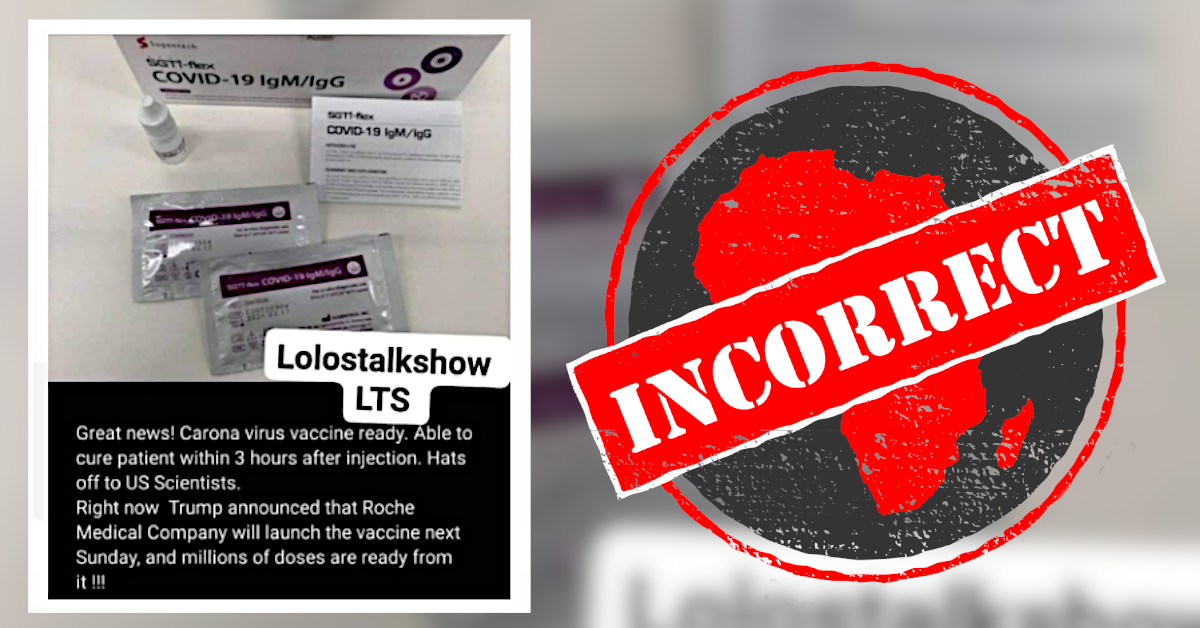A message doing the rounds on WhatsApp is jubilant. “Great news! Carona virus vaccine ready. Able to cure patient within 3 hours after injection. Hats off to US Scientists,” it reads.
The message, also shared on Facebook, claims that US president Donald Trump has “announced that Roche Medical Company will launch the vaccine next Sunday, and millions of doses are ready from it”.
This sounds too good to be true, but have US scientists created a vaccine against the new strain of coronavirus that causes Covid-19?

There have been no reports by credible news organisations of US scientists creating a new coronavirus vaccine. This would have been big news, and covered widely across the world.
But there have been a number of news reports about multinational healthcare company Roche shipping 400,000 Covid-19 tests to laboratories across the US. The social media posts might be misunderstanding and misreporting the rollout of Roche test kits.
It is also worth noting that a vaccine would not be able to “cure [a] patient within 3 hours”. Vaccines prevent a person from contracting a disease in the first place, they do not “cure” already sick patients.
The World Health Organization told Africa Check by email that it usually takes several years to develop a vaccine. But they are working fast to develop one for the new coronavirus “by harnessing global efforts”.
“So far the WHO has received applications for review and approval of 20 vaccines [which] are in development and many clinical trials of therapeutics are underway. We expect the first results in a few weeks.”
But any reports of either a cure or a vaccine for Covid-19 are, as yet, incorrect. – Motunrayo Joel
The message, also shared on Facebook, claims that US president Donald Trump has “announced that Roche Medical Company will launch the vaccine next Sunday, and millions of doses are ready from it”.
This sounds too good to be true, but have US scientists created a vaccine against the new strain of coronavirus that causes Covid-19?

‘Test kit not vaccine’
There have been no reports by credible news organisations of US scientists creating a new coronavirus vaccine. This would have been big news, and covered widely across the world.
But there have been a number of news reports about multinational healthcare company Roche shipping 400,000 Covid-19 tests to laboratories across the US. The social media posts might be misunderstanding and misreporting the rollout of Roche test kits.
It is also worth noting that a vaccine would not be able to “cure [a] patient within 3 hours”. Vaccines prevent a person from contracting a disease in the first place, they do not “cure” already sick patients.
The World Health Organization told Africa Check by email that it usually takes several years to develop a vaccine. But they are working fast to develop one for the new coronavirus “by harnessing global efforts”.
“So far the WHO has received applications for review and approval of 20 vaccines [which] are in development and many clinical trials of therapeutics are underway. We expect the first results in a few weeks.”
But any reports of either a cure or a vaccine for Covid-19 are, as yet, incorrect. – Motunrayo Joel
Republish our content for free
For publishers: what to do if your post is rated false
A fact-checker has rated your Facebook or Instagram post as “false”, “altered”, “partly false” or “missing context”. This could have serious consequences. What do you do?
Click on our guide for the steps you should follow.
Publishers guideAfrica Check teams up with Facebook
Africa Check is a partner in Meta's third-party fact-checking programme to help stop the spread of false information on social media.
The content we rate as “false” will be downgraded on Facebook and Instagram. This means fewer people will see it.
You can also help identify false information on Facebook. This guide explains how.





Add new comment